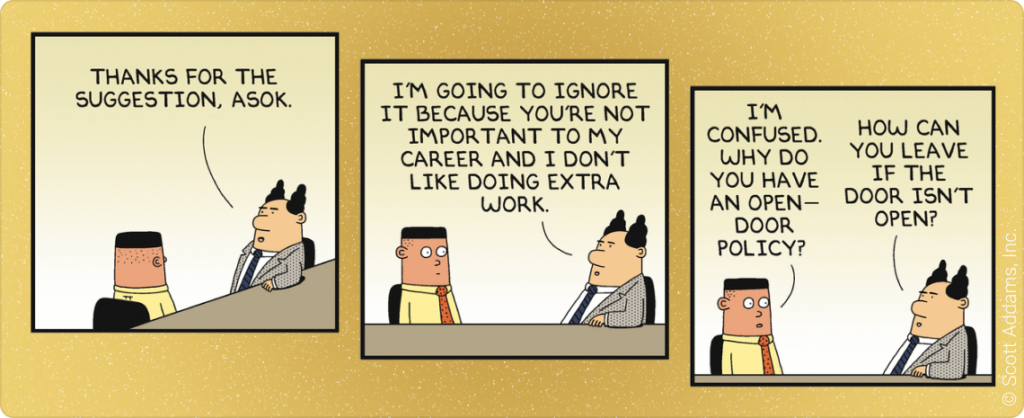How to Gain Respect in the Workplace: Leadership Tips That Earn Employees’ Respect

Where is the line between respect and fear? Certainly, it’s a blurred one! And in the workplace, respect is something that has to be earned. When it comes to the workplace, many people think respect is all about being in a position of authority. However, this isn’t always the case. Employees respect leaders who are genuine and honest with them and who care about their well-being.
Yes, respect is more along the lines of kindness and openness than authority itself. It is built on trust and appreciation, not intimidation. In this blog post, we will discuss some tips on how you can gain respect from your employees and create a more positive work environment.
Stay tuned!
What is a Respect in Terms of Workplace?
“Respect” is a term like “empathy,” “love,” and “compassion” that everyone accepts denotes a positive quality, yet it doesn’t always mean the same for everyone. Let’s review a definition!
Respect is a feeling of admiration or deference for a person, animal, institution, concept, or object. It can be earned through acts of kindness or bravery, or it can be given freely without any expectation of repayment.
Demands for respect could frequently be met by establishing interpersonal bonds based on the acknowledgment of one another as equals

Respect Definition: Showing High Regard for self, others and property
When respect is given, it creates an emotional bond that can lead to increased cooperation and understanding. Additionally, respect is often reciprocal, meaning that when we show respect to others, they are more likely to return the favor. Ultimately, respect is about valuing others and treating them with consideration and esteem. It is an essential ingredient in any healthy relationship.
There are different ways respect can manifest in the workplace. For some workers, respect might mean being treated fairly and with consideration. Others might feel respected when their opinions are solicited and valued or when they’re given opportunities to grow professionally.
What all these definitions of respect have in common is the idea of treating others the way you would want to be treated. That’s the golden rule!
Get more out of your business
Get the best employee engagement content every week via mailing list

Why Respect in the Workplace?
Respect is a fundamental value that should be present in the workplace. To reaffirm this premise, according to responders in a poll conducted by Christine Porath of Georgetown University of nearly 20,000 employees worldwide, respect was listed as the most crucial leadership behavior.
Respectful employees are more likely to communicate effectively and work together harmoniously. They are also less likely to engage in negative behaviors such as gossiping or backstabbing. When respect is present in the workplace, it can lead to increased creativity and innovation.
- Create Stronger Corporate Culture and Reptutation
- Strengthen Attraction and Retention of Employees
- Enchange Organizational Health
- Reduced Illness and Anbsenteeism
- Increased Productivity and Profitability
As well, a culture of respect makes employees feel comfortable sharing new ideas and taking risks when they know that their colleagues and superiors will treat them with consideration. Employees who feel respected are more likely to be engaged with their work and committed to their employer.
A culture of respect can also increase creativity and innovation, as well as teamwork and collaboration. Additionally, respect can lead to increased productivity and reduced absenteeism and turnover. In truth, respect is simply good for business as it helps create a positive reputation and attract top talent.
- Improve Team Communication
- Comply with Canadian Labour Code
- Increase Morale
- Miltigate Legal Liability
- Create a Psycholocically-Safe Work Environment
However, there is no magic wand to promote respect out of nowhere. A culture of respect has to be worked on daily. Therefore, to create a respect-filled workplace, leaders need to set the tone and lead by example.
Let’s review how!

How to Gain Respect in the Workplace: Leadership Tips That Earn Employees’ Respect
It can be difficult to earn respect, especially in the workplace. Here are some tips on how you can gain respect from your employees and create a more positive work environment:
If we follow the premise that respect is a two way-road, before wanting to gain respect as a leader, ask yourself:
- Do my employees feel respected?
- Do my employees feel like their voices are heard?
- Do they feel valued and appreciated?
- Do they feel like they have opportunities to grow and develop professionally?
If you answered no to any of these questions, don’t worry! There’s room for improvement.
Authority Does Not Always Mean Respect
First of all, respect is not simply given to those in positions of authority. Just because someone has been with the company for a longer time or has a higher position than others, doesn’t mean they will be respected by their employees. In fact, many times, it’s the opposite.
If an authority figure belittles, threatens, or mistreats those beneath them, respect will be lost. Respect is a two-way street: if you want your employees to respect you as leaders, you must first show respect for them.
Likewise, if employees are constantly challenging authority or breaking rules, respect will also be lost. For respect to be present in the workplace, both sides need to be willing to work together and show respect for one another.
Show Confidence in Your Ability to Lead
Back in the Roman Empire era, warriors trusted their leaders implicitly. They knew they were being led by brave and intelligent commanders!
Therefore, to gain respect, you need to show confidence in your ability to lead. If you don’t believe in yourself, your employees won’t either. Leaders who are confident in their abilities can take risks and make decisions without being afraid of the consequences.
This means being secure in your decision-making, being able to handle criticism, and being able to delegate tasks confidently
Confident leaders inspire conviction in those around them and create an environment where respect can flourish. On the other hand, leaders who lack confidence tend to micromanage and be overbearing, which will only breed resentment from employees.
Practice essential leadership such as the ones below!
- Communication
- Motivation
- Positivity
- Creativity
- Feedback
Be a Good Listener
Listening is a skill that is often underrated. In today’s fast-paced world, it can be easy to sacrifice quality listening to simply get the information we need and move on.
One of the most important things you can do as a leader is to actively listen to your employees. Showing that you’re interested in what they have to say and are willing to consider their suggestions will go a long way in gaining respect.
Active listening shows that you respect what others have to say and are interested in hearing more. It’s also an important skill for managing conflict and building consensus
Active Listening Skills includes a list of factors, such as:
- Open-ended questions
- Clarification request
- Being attentive
- Summarization
- Paraphrase
- Feelings reflection
- Being attuned to feelings
- Asking a probing questions
Act on Your Employee’s Suggestions
Imagine both you and your employees spent most of the morning talking about the company; they gave you a list of issues to solve or just suggestions for them never to be taken into account!
Your employees have likely worked hard to summarize those for you, so one way to show that you respect their judgment: act on their suggestions. After all, they are the ones who are on the front lines, dealing with customers and clients day in and day out.
They know what works and what doesn’t, and they have ideas about how to improve the workplace
When you take the time to listen to their suggestions and then act on them, it sends a strong message that you respect their opinion and value their input. In today’s competitive marketplace, happy and engaged employees are essential for success.
Encourage an Open-Door Policy
An open-door policy is a way of doing business in which the doors to a leader’s office are literally and figuratively open to employees. The policy signals that the leader is approachable and available to discuss concerns or give feedback.
An open-door policy fosters two-way communication and shows employees that their voices are heard
It also gives employees a sense of ownership over the company’s direction and builds trust between leaders and employees. While an open-door policy can’t solve all workplace problems, it does show respect for employees and create an environment where respect can flourish.
Their Success is Your Success
As a leader, you need to walk your talk! If you are implementing an open-door policy, make sure it is a real, tangible strategy, not just for aesthetics like the “leader” below.

As a leader, your success is ultimately dependent on the success of your team. If they’re not successful, you’re not successful.
Showing respect for your employees and their ability to do their job well is one way to foster a sense of ownership and responsibility for their work. Encouraging them to take pride in their work and celebrating their successes sends a strong message that you respect them and value their contribution to the company.
Encourage Open Communication
Read this! It may sound groundbreaking… But what if you actually TALK with your employees?
Open communication is key in any relationship, and the employer-employee relationship is no different. If you want respect from your employees, you need to create an environment where they feel comfortable communicating with you.
This means being approachable and available when they need to talk to you. It also means being transparent with them about company decisions, changes, etc. Employees who feel like they’re in the dark will become wary of you and the company you represent.
Apologize and Own Your Mistakes
Leaders are human too, and we all make mistakes. What sets great leaders apart is their ability to own their mistakes and learn from them.
When you make a mistake, apologize to your employees
Show them that you’re willing to take responsibility for your actions and that you’re open to feedback. This will show them that you respect their opinion and value their input.
Great leaders know that admitting their mistakes is a sign of strength, not weakness. It takes courage to stand up in front of your team and say, “I was wrong.” But doing so shows respect for your employees and builds trust between you and them.
Be Fair and Consistent With Your Employees
Thoughtful leaders are fair and consistent with their employees. They treat everyone equally and don’t play favorites. They also follow through on their promises and hold employees accountable for their actions.
This type of leader creates an environment of trust, respect, and cooperation. Employees know what to expect from their leader and feel comfortable coming to them with concerns or suggestions.
Being fair and consistent doesn’t mean you have to be best friends with your employees. But it does mean treating them with respect and showing them that you value their contribution to the company.
Be Loyal to the Company Culture
Respect starts at the top, and as a leader, you need to respect your company’s culture. This means being an advocate for the company’s values and mission. It also means setting the tone for how employees should behave.
If you want respect from your employees, you need to show them that you respect the company they work for. This will create a sense of loyalty and pride in the company that will extend to its employees.
When you respect your company’s culture, it shows in everything you do. From the way you treat customers to the way you interact with other employees, your actions speak louder than words.
Respect is Earned, Not Given
Let’s say you are a new manager in the company. Will you expect your employees to respect you right away? We are not implying you have to tolerate rude behavior, but can respect be earned so easily? Respect takes time, and effort, and a bit of strategy too!
Earning respect from your employer requires hard work and dedication. It is not something that is given simply because you have been with the company for a long time or have a certain title
The Power of Predictability
Predictability in behavior and actions lays a strong foundation for trust. When people know what to expect from you, they are more likely to believe in your abilities and intentions. This is particularly true in professional settings, where consistency in performance and decision-making processes can significantly enhance your credibility.
- Establish a routine that others can rely on.
- Communicate your plans and intentions clearly to avoid surprises.
- Be punctual in your engagements and deadlines.
By demonstrating a pattern of predictable responses and actions, you signal to colleagues and clients that you are a stable and reliable figure. This predictability doesn’t mean you lack flexibility or creativity; rather, it assures others that you can be counted on to deliver what you promise, fostering a sense of security and trust that is invaluable in any relationship.
Maintaining Reliability in Your Commitments
To be seen as reliable, one must ensure that their actions align with their promises. This means not only agreeing to tasks or projects but also following through with them to completion. Here are some key strategies to help maintain reliability in your commitments:
- Prioritize your tasks: Understand your workload and prioritize tasks based on their importance and deadlines.
- Communicate proactively: If a commitment cannot be met, communicate this early to all stakeholders. Provide explanations and, if possible, alternative solutions.
- Set realistic expectations: Only commit to what you can reasonably accomplish. Overpromising and underdelivering can damage your credibility.
By adhering to these practices, you demonstrate a level of professionalism that others can depend on. This not only strengthens your relationships but also sets a standard for others to follow. Remember, reliability is not just about meeting expectations; it’s about setting them realistically and then exceeding them whenever possible.
Consistent Quality: The Hallmark of Trustworthiness
Delivering consistent quality in your work is a tangible demonstration of your commitment to excellence. It’s a practice that not only enhances your reputation but also builds a strong foundation of trust with colleagues, clients, and stakeholders.
- Set Clear Standards: Begin by establishing clear quality standards for your work. This ensures that everyone involved understands the level of excellence expected.
- Regular Feedback: Seek regular feedback to gauge whether your output meets or exceeds these standards.
- Continuous Improvement: Use feedback to continuously improve your processes and outputs, ensuring that quality remains high over time.
Remember, consistency in quality doesn’t mean a lack of innovation. On the contrary, it involves a balance between maintaining high standards and adapting to new challenges and opportunities. By doing so, you solidify your credibility as a professional who can be relied upon to deliver exceptional work consistently.
Mastering the Art of Active Listening
Active listening is a critical skill for building credibility. It involves fully concentrating on the speaker, understanding their message, and responding thoughtfully. To practice active listening, one must:
- Be Present: Give the speaker your undivided attention. Avoid distractions and focus on their words, tone, and body language.
- Show Engagement: Nodding, maintaining eye contact, and offering small verbal affirmations like “I see” or “Go on” can encourage the speaker and show that you are engaged.
- Withhold Judgment: Listen without forming opinions or interrupting. Allow the speaker to express their thoughts fully before you respond.
- Reflect and Clarify: Paraphrase what has been said to ensure understanding. Ask questions if clarification is needed.
- Empathize: Try to understand the speaker’s perspective and feelings. Empathy can build a deeper connection and enhance trust.
By honing the art of active listening, you demonstrate respect and value for others’ contributions, laying a strong foundation for mutual trust and credibility.
Clear and Concise Messaging
In the realm of credibility, the ability to communicate clearly and concisely cannot be overstated. It is the cornerstone of ensuring that your message is not only heard but understood and remembered. To achieve this, one must be deliberate in their choice of words, avoiding unnecessary jargon and complexity.
Here are some key strategies to enhance the clarity and brevity of your messaging:
- Get to the Point: Begin with the most important information. This respects your audience’s time and attention.
- Simplify Your Language: Use straightforward language that can be easily understood by your intended audience.
- Structure Your Message: Organize your thoughts logically, with a clear beginning, middle, and end.
- Edit Ruthlessly: After drafting your message, review it with a critical eye. Remove redundancies and refine your sentences for maximum impact.
Remember, the goal is not to impress with complex vocabulary but to express your ideas with precision and simplicity. By honing this skill, you will not only foster better understanding but also reinforce your reputation as a clear thinker and communicator.

Navigating difficult conversations requires a blend of empathy, clarity, and respect. The goal is to communicate effectively without compromising the relationship. Here are some strategies to handle these conversations with tact:
- Prepare and Reflect: Before the conversation, take time to understand the issue and reflect on your own position. Anticipate concerns and prepare to address them calmly.
- Listen Actively: Give the other person your full attention. Listen to understand, not just to respond. Acknowledge their feelings and perspectives.
- Stay Calm and Composed: Keep your emotions in check. Respond thoughtfully rather than reacting impulsively.
- Use ‘I’ Statements: Speak from your own experience to avoid sounding accusatory. For example, ‘I feel…’ instead of ‘You always…’.
- Seek Common Ground: Aim to find areas of agreement that can serve as a foundation for resolving differences.
- Follow Up: After the conversation, take steps to ensure that any agreements are implemented and that the lines of communication remain open.
By incorporating these practices, you can turn challenging dialogues into opportunities for growth and understanding.
Continuous Learning and Skill Development
In the ever-evolving landscape of any industry, the importance of continuous learning cannot be overstated. It is the fuel that powers the engine of expertise, enabling professionals to stay relevant and competitive.
- Embrace a Growth Mindset: Adopt the belief that your abilities can be developed through dedication and hard work. This perspective encourages a love for learning and a resilience that is essential for great accomplishment.
- Set Learning Goals: Identify specific skills or knowledge areas you wish to develop. Setting clear objectives provides direction and helps measure progress.
- Seek Formal and Informal Education: Take advantage of courses, workshops, and seminars. Equally, learn from everyday experiences and the people around you.
- Apply New Knowledge: Put what you learn into practice. This not only reinforces your new skills but also demonstrates your commitment to growth.
By integrating these habits into your routine, you establish yourself as a lifelong learner, which is a cornerstone of true expertise and credibility in your field.
Sharing Knowledge and Mentoring Others
Imparting wisdom and experience to colleagues is not just an act of generosity; it’s a cornerstone of professional growth for both the mentor and the mentee. When you share your knowledge, you reinforce your own expertise and gain new insights through teaching.
- Identify Potential Mentees: Look for individuals who show a genuine interest in learning and who can benefit from your experience.
- Tailor Your Approach: Each mentee is unique. Customize your mentoring to their specific needs and learning style.
- Encourage Questions: Create an environment where mentees feel comfortable asking questions and exploring new ideas.
Mentoring is a two-way street that requires active engagement and openness from both parties. As a mentor, you not only contribute to the development of future leaders in your field, but you also solidify your own understanding and continue to evolve professionally.
Staying Ahead of Industry Trends
In the ever-evolving landscape of any industry, staying current with trends is not just beneficial; it’s imperative for maintaining credibility. Being well-informed positions you as a forward-thinking leader, someone who anticipates changes and adapts strategies accordingly.
- To stay ahead, consider the following actions:
- Regularly read industry publications and research papers.
- Attend conferences, webinars, and workshops to gain insights from thought leaders.
- Engage with online communities and professional networks to exchange ideas.
- Implement new technologies and methodologies in your work to test their efficacy.
By proactively seeking knowledge and embracing innovation, you signal to peers and clients that you are committed to excellence. This habit not only enhances your expertise but also ensures that your advice and services remain relevant and valuable.
Honesty in All Dealings
Honesty is the cornerstone of all credible relationships, whether personal or professional. It fosters an environment of trust and respect, which are essential for long-term success. To practice honesty in all dealings, consider the following points:
- Be Transparent: Always communicate openly and provide full disclosure when necessary. Transparency eliminates misunderstandings and builds a foundation of trust.
- Keep Promises: If you commit to something, follow through. Breaking promises can damage your reputation and erode trust.
- Speak Truthfully: Even when it’s difficult, tell the truth. Honesty sometimes requires courage, especially when facing uncomfortable situations.
Cultivating honesty isn’t just about avoiding lies; it’s about being genuine in your interactions and decisions. When people know they can rely on your word, your credibility naturally increases. This, in turn, opens doors to new opportunities and strengthens existing relationships.
The Courage to Admit Mistakes
Admitting mistakes is not just an act of honesty; it’s a demonstration of strength and self-awareness. It requires the courage to face the potential judgment of others, but it also opens the door to learning and growth. Here are some key points to consider:
- Acknowledgment: The first step is to recognize and accept your error. This shows that you are attentive and committed to reality, not just your perception of it.
- Apology: A sincere apology can go a long way in repairing any damage caused. It conveys respect for those affected by the mistake.
- Action: After admitting the mistake, it’s crucial to take corrective action. This might involve making changes to prevent similar errors in the future or making amends if possible.
- Accountability: Hold yourself accountable for your mistakes. This builds character and encourages others to trust in your ability to handle challenges responsibly.
By embracing the courage to admit mistakes, you not only enhance your credibility but also foster an environment where honesty is valued and mistakes are viewed as opportunities for improvement.
Upholding Ethical Standards
In the realm of credibility, ethical standards serve as the bedrock upon which trust is built. Upholding these standards is not just about adhering to external regulations; it’s about cultivating an inner compass that guides every decision and interaction.
- Lead by Example: Demonstrate ethical behavior in all actions, setting a precedent for others to follow.
- Transparent Decision-Making: Ensure that the rationale behind decisions is clear and justifiable, fostering an environment of openness.
- Accountability: Take responsibility for actions and their outcomes, showing a commitment to ethical practices even when it’s challenging.
By consistently applying these principles, professionals can create a culture of integrity that resonates with colleagues, clients, and the broader community. It’s this unwavering commitment to doing what’s right that solidifies a reputation for integrity and, ultimately, credibility.

Creating Meaningful Professional Connections
In the realm of professional growth, the importance of forging meaningful connections cannot be overstated. These relationships serve as the bedrock upon which collaborative opportunities and career advancement are built. To create such connections, one must approach networking with a genuine interest in others, rather than a self-serving agenda.
- Begin by identifying individuals whose interests align with your own professional goals. Attend industry events, join relevant forums, and participate in online communities to increase your visibility.
- When engaging with others, focus on how you can help them. Offer your expertise, make introductions, or share resources. This approach not only endears you to your peers but also establishes you as a valuable member of your professional circle.
- Follow up is crucial. After initial contact, reach out with a personalized message referencing your conversation. This demonstrates attentiveness and a sincere interest in maintaining the connection.
Remember, the goal is to build a network of contacts with whom you can share a mutually beneficial relationship. It’s about quality, not just quantity. By investing time and effort into each interaction, you cultivate a network that can support your professional journey for years to come.
The Role of Empathy in Networking
Empathy is a powerful tool in networking that goes beyond mere social pleasantries. It involves genuinely understanding and sharing the feelings of others, which can lead to stronger and more meaningful professional relationships. By practicing empathy, you can create a network that is not only wide but also deep, with connections that are likely to be more supportive and enduring.
- Listen Actively: Pay close attention to what others are saying and show that you understand their perspective.
- Ask Insightful Questions: Demonstrate your interest in their experiences and challenges.
- Share Experiences: When appropriate, share your own stories that relate to their situation, showing solidarity and understanding.
Empathy in networking also means being sensitive to the emotions and needs of others. It’s about being approachable and available to your connections, offering help when you can, and knowing when to ask for help in return. This reciprocal relationship fosters a sense of community and belonging, which is invaluable in the professional world.
Sustaining Long-Term Professional Relationships
The art of maintaining long-term professional relationships lies in the delicate balance of give and take. It’s about nurturing connections that are mutually beneficial and respectful over time. To achieve this, one must be proactive in reaching out, checking in, and offering support without the immediate expectation of return.
- Stay in Touch: Regular communication is key. Whether it’s through email, social media, or face-to-face meetings, keeping the lines of communication open is essential.
- Add Value: Always look for ways to contribute positively to the relationship. This could be through sharing resources, providing introductions, or simply offering a listening ear.
- Be Genuine: Authenticity fosters trust. Be yourself and allow your professional relationships to grow organically.
Remember, the strongest professional relationships are those where both parties feel valued and understood. They require effort and intentionality but are worth the investment as they often lead to new opportunities and enduring support networks.
Conclusion
In the journey to cultivating credibility, each habit we adopt serves as a stepping stone towards becoming a person of integrity and respect. The ’10 Habits That Will Make You Well Respected at Work’ are not just practices but are the embodiment of a mindset that values reliability, professionalism, and authenticity. As we consistently apply these habits in our daily routines, we not only enhance our own reputations but also contribute positively to our work environments. Remember, credibility is not built overnight, but through a persistent commitment to these principles, one habit at a time. Let’s strive to be the exemplars of credibility in our respective fields, influencing others by our actions and establishing a legacy of trustworthiness that transcends our tenure.
— The Monitask Team
Frequently Asked Questions
Why is effective communication important for credibility?
Effective communication is crucial because it ensures that messages are understood clearly and without confusion. It involves active listening, clarity, and the ability to handle difficult conversations with diplomacy. These skills help in building a reputation as a credible and reliable professional.
What role does continuous learning play in building expertise?
Continuous learning is key to maintaining and expanding expertise in any field. By staying updated with the latest knowledge, skills, and industry trends, professionals can offer valuable insights, make informed decisions, and maintain a competitive edge, which enhances their credibility.
How can admitting mistakes contribute to a reputation for integrity?
Admitting mistakes shows honesty and accountability, which are critical components of integrity. It demonstrates a commitment to ethical standards and the courage to face and rectify errors, which can strengthen trust and respect from peers and clients.
What is the importance of empathy in professional networking?
Empathy is important in networking as it helps in understanding and relating to the perspectives and challenges of others. This emotional intelligence can lead to deeper connections, mutual support, and more meaningful professional relationships.
Can you provide tips for maintaining long-term professional relationships?
To maintain long-term professional relationships, it’s essential to keep in regular contact, provide mutual support, be trustworthy, and show genuine interest in the other person’s success. Networking should be a two-way street, with both parties benefiting from the relationship.


